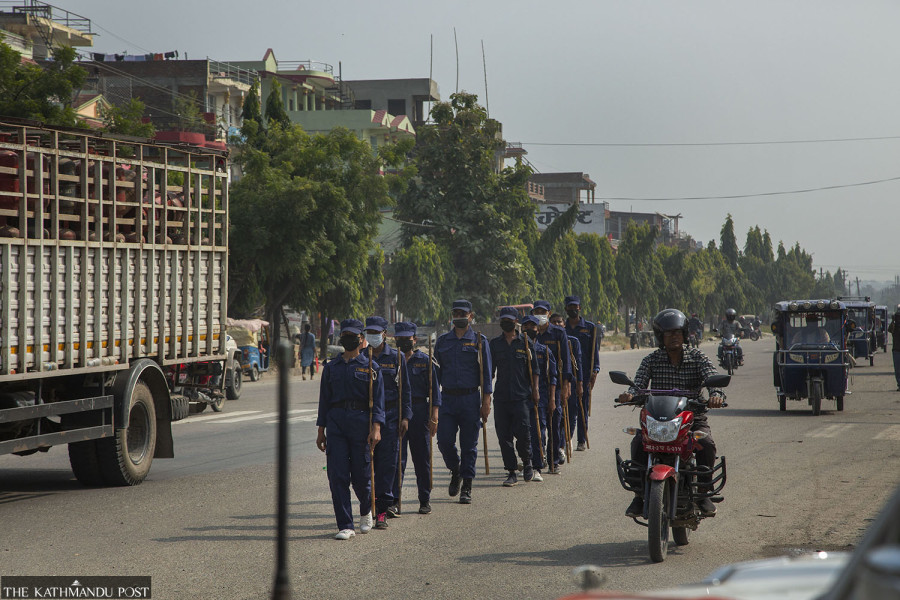National
Country goes to polls in a relatively safe environment
Some two dozen small groups have announced election boycott but they reportedly pose no big threat.
Anil Giri
The authorities have assured fool-proof security for Sunday’s provincial and federal elections.
Assuaging security concerns, Chief Election Commissioner Dinesh Thapaliya said on Thursday that a three-tier security arrangement has been ensured in each polling booth while claiming that the commission would do all to ensure that the elections are conducted in a free, fair, transparent and credible manner.
Organising a press conference at the Election Commission, Thapaliya said reserve units of security personnel that can reach any polling station within 30 minutes have also been set up.
“All necessary measures will be taken to prevent anomalies like voter intimidation, vote rigging and ballot stuffing. Based on risk assessment, security patrols will be conducted and legal action taken against anyone trying to disturb the election process,” said Thapaliya.
A small number of political outfits including the Netra Bikram Chand-led Communist Party of Nepal and Mohan Baidya-led Communist Party of Nepal (Revolutionary Maoist) have already announced to stay away from the elections.
According to the Ministry of Home Affairs, a total of 298,589 security personnel will be deployed to guard voting booths. Of them, 74,849 will be from the Nepal Army, 71,693 from the Nepal Police, 35,116 from the Armed Police Force, 115,000 temporary police, and 1,921 from the National Intelligence Department.
“A few incidents of bombings that have been reported in some districts recently suggest some forces are trying to disturb the elections, but we are ready to tackle them,” said Fanindra Mani Pokharel, spokesperson at the Ministry of Home Affairs, adding, “They are security threats, but not serious ones.”
On Wednesday, a meeting of the high-level election security committee had instructed the Home Ministry and other government agencies to prepare a credible strategy to deal with those trying to intimidate voters through violence including use of weapons.
The meeting, which took place at the Election Commission, also instructed the Home Ministry to monitor election code violations and take stern action against anyone involved in the supply or consumption of alcohol and other activities that disturb elections.
The commission has also instructed the authorities concerned to restrict the movement of vehicles other than those used by essential services, on the election day.
According to the commission, there will be a total of 10,892 polling stations and 22,227 polling centers across the country.
Similarly, as per the law, security personnel and civil servants deployed on election duty will not be allowed to vote under the first-past-the-post elections—they can only vote under the proportional representation system.
The commission has set up 141 temporary booths across the country for those voting only under the proportional representation, said Thapaliya.
“As almost all political forces are participating in the elections, the security threat is relatively low this time, but again, we are not taking election security lightly. The government, in coordination with the Election Commission, is fully prepared to tackle security challenges, if any,” said Pokharel.
Compared to the past, elections this time are taking place in a relatively peaceful political environment. Currently there are no armed outfits in the Tarai and after the 2017 elections, the two remaining armed outfits—one led by Netra Bikram Chand and another by CK Raut—have publicly renounced violence and joined peaceful politics.
Security officials, however, say there is still the risk of violence by the parties participating in the elections.
The Home Ministry has urged all 77 district administration offices to review and evaluate the situation along international border points to prevent criminal groups from sneaking into Nepal and to avoid possible encounters between rival party workers.
Some 20-25 small groups that are neither registered with the Election Commission nor have a sizable base, have announced to boycott the elections, but they do not pose a significant security threat, said Pokharel, the Home Ministry spokesman.
During the local elections last May, a total of 741 incidents related to election security were recorded, said Hemanta Malla, former deputy inspector general of the Nepal Police. “This time, we expect around 200 such incidents, big or small. The Chand-led party does not pose a significant threat and those small outfits are no threat either,” said Malla.
“Unlike in the 2017 elections, there is less security threat this time. But the parties participating in the elections could themselves cause disturbances,” Malla added. “Party cadres could engage in scuffles and brawls on the election day and afterwards, especially in some outlying areas where the security presence is relatively low.”




 13.12°C Kathmandu
13.12°C Kathmandu














